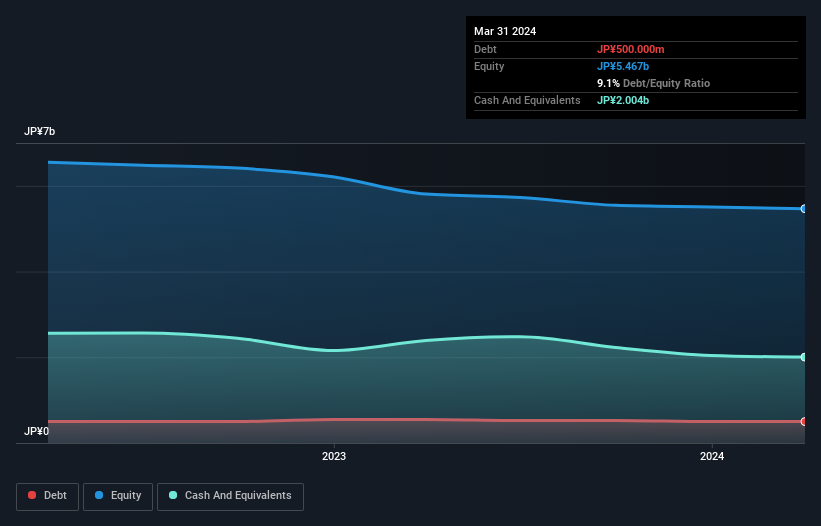
The external fund manager backed by Berkshire Hathaway's Charlie Munger, Li Lu, makes no bones about it when he says 'The biggest investment risk is not the volatility of prices, but whether you will suffer a permanent loss of capital.' So it might be obvious that you need to consider debt, when you think about how risky any given stock is, because too much debt can sink a company. As with many other companies Spancrete Corporation (TSE:5277) makes use of debt. But should shareholders be worried about its use of debt?
What Risk Does Debt Bring?
Debt and other liabilities become risky for a business when it cannot easily fulfill those obligations, either with free cash flow or by raising capital at an attractive price. Ultimately, if the company can't fulfill its legal obligations to repay debt, shareholders could walk away with nothing. However, a more frequent (but still costly) occurrence is where a company must issue shares at bargain-basement prices, permanently diluting shareholders, just to shore up its balance sheet. Having said that, the most common situation is where a company manages its debt reasonably well - and to its own advantage. When we think about a company's use of debt, we first look at cash and debt together.
See our latest analysis for Spancrete
What Is Spancrete's Debt?
As you can see below, Spancrete had JP¥500.0m of debt at March 2024, down from JP¥548.0m a year prior. However, its balance sheet shows it holds JP¥2.00b in cash, so it actually has JP¥1.50b net cash.

A Look At Spancrete's Liabilities
Zooming in on the latest balance sheet data, we can see that Spancrete had liabilities of JP¥736.0m due within 12 months and liabilities of JP¥448.0m due beyond that. Offsetting these obligations, it had cash of JP¥2.00b as well as receivables valued at JP¥651.0m due within 12 months. So it actually has JP¥1.47b more liquid assets than total liabilities.
This luscious liquidity implies that Spancrete's balance sheet is sturdy like a giant sequoia tree. On this view, lenders should feel as safe as the beloved of a black-belt karate master. Simply put, the fact that Spancrete has more cash than debt is arguably a good indication that it can manage its debt safely. The balance sheet is clearly the area to focus on when you are analysing debt. But you can't view debt in total isolation; since Spancrete will need earnings to service that debt. So if you're keen to discover more about its earnings, it might be worth checking out this graph of its long term earnings trend.
In the last year Spancrete had a loss before interest and tax, and actually shrunk its revenue by 10%, to JP¥2.0b. We would much prefer see growth.
So How Risky Is Spancrete?
By their very nature companies that are losing money are more risky than those with a long history of profitability. And we do note that Spancrete had an earnings before interest and tax (EBIT) loss, over the last year. Indeed, in that time it burnt through JP¥348m of cash and made a loss of JP¥301m. While this does make the company a bit risky, it's important to remember it has net cash of JP¥1.50b. That kitty means the company can keep spending for growth for at least two years, at current rates. Overall, its balance sheet doesn't seem overly risky, at the moment, but we're always cautious until we see the positive free cash flow. There's no doubt that we learn most about debt from the balance sheet. However, not all investment risk resides within the balance sheet - far from it. To that end, you should learn about the 3 warning signs we've spotted with Spancrete (including 2 which don't sit too well with us) .
Of course, if you're the type of investor who prefers buying stocks without the burden of debt, then don't hesitate to discover our exclusive list of net cash growth stocks, today.
New: Manage All Your Stock Portfolios in One Place
We've created the ultimate portfolio companion for stock investors, and it's free.
• Connect an unlimited number of Portfolios and see your total in one currency
• Be alerted to new Warning Signs or Risks via email or mobile
• Track the Fair Value of your stocks
Have feedback on this article? Concerned about the content? Get in touch with us directly. Alternatively, email editorial-team (at) simplywallst.com.
This article by Simply Wall St is general in nature. We provide commentary based on historical data and analyst forecasts only using an unbiased methodology and our articles are not intended to be financial advice. It does not constitute a recommendation to buy or sell any stock, and does not take account of your objectives, or your financial situation. We aim to bring you long-term focused analysis driven by fundamental data. Note that our analysis may not factor in the latest price-sensitive company announcements or qualitative material. Simply Wall St has no position in any stocks mentioned.
Have feedback on this article? Concerned about the content? Get in touch with us directly. Alternatively, email editorial-team@simplywallst.com
About TSE:5277
Slight with mediocre balance sheet.
Market Insights
Community Narratives



